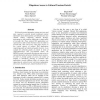Free Online Productivity Tools
i2Speak
i2Symbol
i2OCR
iTex2Img
iWeb2Print
iWeb2Shot
i2Type
iPdf2Split
iPdf2Merge
i2Bopomofo
i2Arabic
i2Style
i2Image
i2PDF
iLatex2Rtf
Sci2ools
DEXAW
2004
IEEE
2004
IEEE
Ubiquitous Access to Cultural Tourism Portals
Web-based tourism information systems are more and more required to provide besides traditional tourism information about hotel facilities and infrastructure also cultural content comprising material heritage, performing art, folk tradition, handicraft or simply habits of everyday life. These cultural Web applications are required not to offer on-line brochures only, but rather to provide both, value and service. This paper focuses on two crucial aspects of cultural Web applications comprising quality of content and quality of access. As an example for achieving quality of content in terms of comprehensiveness and cross-national nature, the MEDINA portal is presented, allowing one-stop access to cultural information of fourteen Mediterranean countries. In order to provide quality of access, the notion of ubiquity is introduced, allowing to customize Web applications towards different kinds of contexts, thus supporting the cultural tourist with device-independent, time-aware, location-...
Content Comprising Material | Cultural Web Applications | Database | DEXAW 2004 | Tourism Information |
| Added | 20 Aug 2010 |
| Updated | 20 Aug 2010 |
| Type | Conference |
| Year | 2004 |
| Where | DEXAW |
| Authors | Franca Garzotto, Paolo Paolini, Marco Speroni, Birgit Pröll, Werner Retschitzegger, Wieland Schwinger |
Comments (0)

